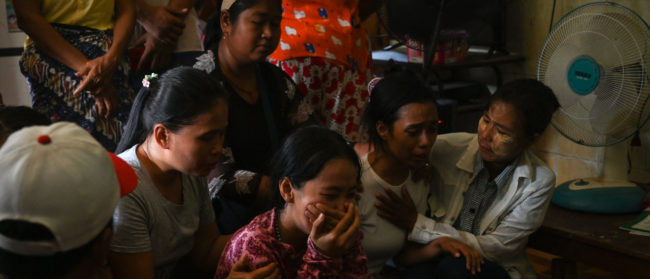Last week, the US Embassy in Phnom Penh released a statement stating its deep concern over continued deforestation, forest degradation and biodiversity loss in Cambodia’s protected woodland areas. The statement, marking World Wildlife Day, highlighted the several factors behind forest loss in Prey Lang Wildlife Sanctuary and throughout the nation, including “weak law enforcement and opaque governance systems”.
Development partners, environmental activists and citizens in Cambodia have repeatedly expressed concern about deforestation and called on authorities to act – but not much can change in the existing situation.
So far, the Cambodian Ministry of Environment and its development partners, as well as environmental defenders, have done a lot of work to defend Cambodia’s forests. But the woodland always loses. In 2020, the MoE cracked down on more than 8,917 crimes committed nationally in protected areas and biodiversity corridors at 86 locations across the country, according to Neth Pheaktra, Secretary of State and spokesperson for the Ministry. These crimes include illegal logging, forest encroachment and wildlife hunting.
Over the past two decades, the country’s forest cover has declined by about 26%, according to Global Forest Watch. For example, in the case of the Prey Lang Wildlife Sanctuary, the University of Copenhagen researcher used a dataset from the University of Maryland’s Global Forest Change and other data points to show that 7,510 hectares of forestland were lost in that time. While the report showed a 73% increase in deforestation in 2019 at Prey Lang compared to 2018.
According to a November 2020 study by Cambodian researcher Sereyrotha Ken and his team, this phenomenon has shown that illegal logging, commercial timber production and clearing for commercial agriculture are the three main direct drivers of deforestation in Prey Lang. Simultaneously, the research outlined the top three hindrances to saving the forest as a lack of law enforcement, strong demand for timber, and land ownership and rights issues. This research also revealed that furniture manufacturers, medium and large scale agricultural investors, charcoal makers, land migrants, firewood collectors, subsistence farmers are the main agents of deforestation and degradation.
The MoE needs to encourage stakeholders, especially young people, to participate in promoting and protecting the green environment
The lack of human capital can be a significant factor in the loss of forests.
In the country as a whole, Cambodia employs approximately 1,200 forest rangers to defend forest and endangered species over more than 7.3 million hectares of protected areas. This means there are 6,333 hectares per ranger, well below the international standard of eight rangers for a territory of 10,000 hectares. In terms of advanced forest protection, an increase in the number of rangers could be a good thing for the MoE to consider.
Besides this, inconsistencies in the work of park rangers and environmental defenders can lead to ineffective forest protection. In fact, the MoE needs to encourage stakeholders, especially young people, to participate in promoting and protecting the green environment. Yet, forestry and security authorities have often arrested environmental activists who enter wildlife sanctuaries and campaign without official permission, or because they are too critical of the authorities.
For example, sometimes youth groups, environment activists, NGOs and forest communities request permission to patrol the forest and conduct other campaigns with the appropriate authorities – but they are not allowed to operate. Most recently, the Cambodian Youth Network (CYN) and the local forest community was refused permission to patrol the Preah Rokar Wildlife Sanctuary from February 20-22 February by the Director of the Preah Vihear Provincial Department of Environment. The reason for this is that CYN refused to sign a memorandum of understanding with the MoE.
To tackle deforestation in Cambodia, it is important for both government authorities and environmental activists to soften their attitudes in order to work together.
Laws are the best mechanism to punish those who destroy woods and commit forest-related crimes. For a long time, however, enforcement of forest laws seems to be ineffective. The authorities should tighten and reform certain laws to impose a heavier punishment on the people who cut down trees and engage in the illegal timber trade. Strict enforcement of laws needs to be implemented to prevent logging and the transportation of timber on roads and across borders. In this sense, MoE authorities should have good collaboration with the local population, the village chief, and other authorities of the Ministry of Interior to monitor, investigate and enforce forest crimes.
Previously, the MoE, the Ministry of Tourism and some NGOs have promoted and encouraged the creation of forest community and community-based ecotourism to prevent deforestation. But while community forest ecotourism has also helped reduce logging, it has not stopped it all.
Establishing these communities can contribute to protecting the forest and generate revenue for community members, but there are many factors that hinder their success, which depends on financial resources, human capital, and a health management system that can produce good products and services to attract clients.
But importantly, there are also indirect policies and actions that can reduce deforestation in Cambodia.
Good cooperation with government, shareholders and development partners has an important role to play in supporting the household economy. Providing technical and financial assistance to local people in various employment sectors is an impactful solution. In this context, exploring options to create local jobs and develop social infrastructure are positive tools to assist local people in stable lives and jobs.
But fundamentally, all this work is very difficult and requires medium- and long-term actions and many resources in various areas, including financial resources, human resources, and the policy framework.
Nith Kosal is Junior Research Fellow at Cambodian think tank Future Forum


